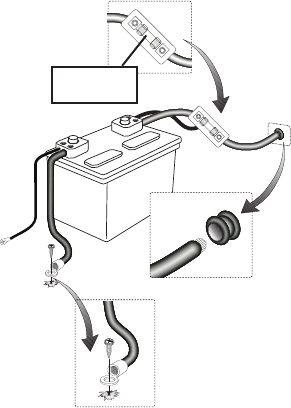
10
Mounting Locations
Engine Compartment
Never mount this unit in the engine compartment. Mounting the unit in the engine compartment will
void your warranty.
Trunk Mounting
Mounting the amplier vertically will provide adequate cooling of the amplier. If you will be mounting
it to an existing panel, be sure it’s not prone to excessive vibration (such as mounting to the back of a
subwoofer enclosure). Excess vibration is not recommended for electronic products, ampliers included.
Mounting the amplier at on the oor of the trunk will provide the best cooling, however be cautious
not to deposit baggage and other items over the top of the amplier. Mounting the amplier upside
down to the rear deck of the trunk will NOT provide adequate heat dissipation and will severely affect
the performance of the amplier and is not recommended.
Passenger Compartment Mounting
Mounting the amplier in the passenger compartment will work as long as you provide a sufcient
amount of air for the amplier to cool itself. If you are going to mount the amplier under the seat of
the vehicle, you must have at least 1 inch (2.54cm) of air gap around the amplier’s heatsink. Mounting
the amplier with less than 1 inch (2.54cm) of air gap around the amplier’s heatsink in the passenger
compartment will not provide proper cooling and will severely affect the performance of the amplier
and is not recommended.
Vehicle Electrical System Requirements
Ampliers (regardless of brand name) will put an increased load on the vehicle’s battery and charging
system. DAT recommends checking your alternator and battery condition to ensure that the electrical
system has enough capacity to handle the increased load of your stereo system. Original equipment
electrical systems which are in good condition should be able to handle the extra load of any DAT ampli-
er without problems, although battery and alternator life can be reduced depending on your individual
listening habits. To maximize the performance of your amplier, we suggest the use of a reserve power
"Stiffening"capacitor.
Wiring the Amplifier
CAUTION: Avoid running power wires near the low level input cables, antenna, power leads, sensitive
equipment or harnesses. The power wires carry substantial current and could radiate noise into the
audio system through the audio cables.
1) Plan the wire routing as described in the “Importance of Pre-
Planning” section. Keep RCA cables close together but isolated
from the amplier’s power cables and any high power auto ac-
cessories, especially electric motors. This is done to prevent
coupling the noise from radiated electrical elds into
the audio signal. When feeding the wires through the
rewall or any metal barrier, protect them with plastic
or rubber grommets to prevent short circuits. Leave
the wires long at this point to adjust for a precise t
at a later time.
2) Prepare the power wire for attachment to the ampli-
er by stripping 5/8 inch (15.9mm) of insulation from
the end of the wire. Insert the bare wire into the B+
terminal and tighten the set screw to secure the cable
in place.
NOTE: The B+ cable MUST be fused 18” or less from
the vehicle’s positive battery post. Choose a location
to install a waterproof fuseholder under the hood
and ensure connections are water tight. If you do not
use the appropriate fuseholder, the connection will
eventually suffer corrosion from moisture and heat.
Install
Main Fuse near
Battery
Wait to insert
fuse until last
Upgraded Ground
Grommet in
Firewall


















